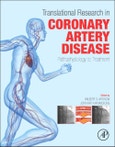Translational Research in Coronary Artery Disease: Pathophysiology to Treatment covers the entire spectrum of basic science, genetics, drug treatment, and interventions for coronary artery disease. With an emphasis on vascular biology, this reference fully explains the fundamental aspects of coronary artery disease pathophysiology.
Included are important topics, including endothelial function, endothelial injury, and endothelial repair in various disease states, vascular smooth muscle function and its interaction with the endothelium, and the interrelationship between inflammatory biology and vascular function.
By providing this synthesis of current research literature, this reference allows the cardiovascular scientist and practitioner to access everything they need from one source.
Please Note: This is an On Demand product, delivery may take up to 11 working days after payment has been received.
Table of Contents
Chapter 1: Endothelial Biology the role of endothelial cells and endothelial progenitor cellsChapter 2: The Role of Vascular Smooth Muscle Phenotype and Cytochrome P450-Derived Eicosanoids in Coronary Artery Disease
Chapter 3: Inflammation and Coronary Artery Disease
Chapter 4: Adiponectin: A mediator of obesity, insulin resistance, diabetes and the metabolic syndrome
Chapter 5: Use of Stem Cells in Ischemic Heart Disease
Chapter 6: Vasculogenesis and Angiogenesis
Chapter 7: Lipids
Chapter 8: Genetics and Coronary Disease
Chapter 9: Nitric Oxide and Heart Failure in the Presence of Coronary Disease
Chapter 10: Revascularization for Silent Myocardial Ischemia
Chapter 11: Noninvasive Diagnostic Modalities for Evaluation of Coronary Artery Disease
Chapter 12: Current Approaches to Treatment of Ventricular Arrhythmias in Patients with Coronary Artery Disease
Chapter 13: Magnetic Resonance Imaging for Clinical Use and Research Investigation in Coronary Artery Disease
Chapter 14: Invasive Diagnostic Assessment of Coronary Artery Disease
Chapter 15: Drug Treatment of Coronary Artery Disease
Chapter 16: Percutaneous Coronary Intervention of Coronary Artery Disease
Chapter 17: Current Topics in Bypass Surgery
Chapter 18: Peripheral Venoarterial Extracorporeal Membrane Oxygenation for Treatment of Ischemic Shock
Chapter 19: Biostatistics Used for Clinical Investigation of Coronary Artery Disease








